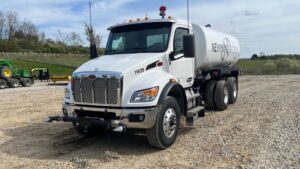Box trucks, also known as cube trucks, straight trucks, or box vans, are one of the most versatile vehicles in the transportation and logistics industry. Distinguished by their enclosed, rectangular cargo space, box trucks are ideal for hauling everything from furniture and electronics to perishables and construction materials. In this article, we’ll explore the key features, specifications, types, and applications of box trucks, and why they remain a popular choice for businesses and drivers alike.
1. What is a Box Truck?
A box truck is a commercial vehicle with a cab attached to a large, enclosed cargo area in the shape of a box. Unlike semi-trucks, where the cab and trailer are separate units, a box truck has an integrated cab and cargo area, giving it the name “straight truck.” The size of a box truck can vary, from smaller 10- to 14-foot trucks suited for local deliveries to larger 26-foot trucks used in logistics and moving services.
Typically, the box portion is made from aluminum or other lightweight metals, often reinforced with wood or plastic inside to protect the cargo. Box trucks come with rear doors that roll up or swing open, making it easy to load and unload items. Some also have side doors for added convenience, especially when accessing items in urban areas where space is limited.
2. Types of Box Trucks
Box trucks come in several different configurations, each suited to specific transportation needs. The main types include:
- Standard Box Trucks: Standard box trucks have a single large cargo area and a rear door, making them ideal for general transportation of goods. They come in various lengths, usually ranging from 10 to 26 feet.
- Cutaway Box Trucks: These trucks have a cutaway cab design that allows direct access between the cab and cargo area, a feature popular with delivery services. The cutaway feature improves efficiency for drivers, allowing them to access items without having to exit the cab.
- Refrigerated Box Trucks (Reefer Trucks): Reefer trucks are equipped with cooling systems that maintain a set temperature, making them ideal for transporting perishable goods such as food, pharmaceuticals, and flowers. They come in various sizes and cooling capacities, depending on the needs of the business.
- Liftgate Box Trucks: These trucks are equipped with a hydraulic lift gate at the rear, which helps lift heavy or bulky items onto the cargo area. They are commonly used for deliveries that involve heavy equipment or palletized goods.
- Flatbed Box Trucks: These box trucks have a flatbed-style cargo area with low side walls, providing more flexibility for hauling oversized or irregularly shaped items that may not fit in a standard box truck.
Each of these types serves specific industries and transportation requirements, making box trucks one of the most adaptable options in commercial transportation.
3. Key Features and Specifications
When selecting a box truck, it’s essential to consider certain specifications that impact its functionality and compatibility with the intended use:
- Cargo Capacity: The size and weight capacity of a box truck are crucial considerations. Cargo capacity is typically measured in cubic feet or tonnage, with smaller box trucks accommodating up to 1,500 cubic feet and larger models offering over 3,000 cubic feet. Payload capacity can range from 5,000 to 10,000 pounds or more, depending on the vehicle’s size and chassis strength.
- Dimensions: Box truck lengths vary significantly, generally between 10 and 26 feet, while the width and height remain relatively consistent to allow maneuverability. Shorter box trucks are ideal for city driving and local deliveries, while longer ones are suitable for larger cargo volumes and long-distance hauls.
- GVWR (Gross Vehicle Weight Rating): GVWR is the maximum weight a truck can handle, including its own weight, cargo, passengers, and fuel. Box trucks are classified into light-duty (Class 3, 10,000–14,000 lbs), medium-duty (Class 4-5, 14,001–26,000 lbs), and heavy-duty (Class 6 and up, over 26,000 lbs) categories based on their GVWR. For businesses, it’s crucial to select a GVWR that matches the weight of the loads they plan to carry.
- Fuel Efficiency: With fuel costs a primary concern for many businesses, fuel efficiency is another important specification. Box trucks often run on diesel engines due to their fuel economy and torque advantages, but gasoline and electric options are increasingly available.
- Engine Power and Transmission: Box trucks are powered by engines that range from 200 to 350 horsepower, with diesel engines offering more torque for heavy loads. Most box trucks use automatic transmissions, though manual options exist for certain types of work or preference.
- Safety Features: Modern box trucks include a range of safety features, such as anti-lock braking systems (ABS), stability control, and lane departure warning systems. Some also come with backup cameras and blind spot monitoring, which are valuable for maneuvering in tight spaces.
4. Applications of Box Trucks
Box trucks have diverse applications and are commonly used across various industries due to their versatility and ease of operation. Here are some of the most common uses:
- Moving Services: Moving companies use box trucks for transporting furniture, appliances, and personal belongings. The enclosed cargo area protects items from weather and damage, making it a popular choice for residential and commercial moves.
- Retail and E-commerce Deliveries: With the growth of online shopping, box trucks have become a backbone of e-commerce logistics. They’re ideal for delivering packages, furniture, and larger items to businesses and consumers. The vehicle’s size allows for easy parking in urban areas, where deliveries are typically made.
- Food and Beverage Transport: For companies transporting perishable goods, refrigerated box trucks maintain food quality by keeping items at the right temperature. These trucks are used by grocery stores, caterers, and beverage distributors to ensure that fresh products reach their destination.
- Construction and Equipment Hauling: Construction companies rely on box trucks to transport equipment, tools, and building materials to job sites. With liftgates and robust cargo capacity, box trucks make it easy to handle heavy items and construction materials, keeping them safe from weather and theft.
- Medical and Pharmaceutical Distribution: Box trucks play a crucial role in transporting medical supplies and pharmaceutical products. Refrigerated box trucks are essential for temperature-sensitive items, ensuring they remain effective and safe for use.
- Municipal and Government Services: Municipalities use box trucks for a range of services, such as transporting equipment, event supplies, and maintenance materials. They are also useful for waste management and recycling collection in urban areas.
5. Benefits of Using Box Trucks
Box trucks offer several advantages, which make them ideal for a wide range of industries and applications:
- Security: The enclosed cargo area protects items from theft and weather, which is essential for valuable and sensitive goods.
- Versatility: Box trucks can be used to transport virtually anything that fits within the cargo area, from furniture to perishable goods. This versatility makes them a valuable asset for many businesses.
- Ease of Use: Box trucks are relatively easy to drive compared to larger tractor-trailers, making them accessible to more drivers. This advantage is especially beneficial for small businesses that don’t require a commercial driver’s license (CDL) for trucks under certain weight thresholds.
- Branding Opportunities: The large side panels of box trucks provide ideal space for branding and advertising, which is useful for companies looking to enhance visibility while on the road.
- Cost Efficiency: Box trucks are generally more fuel-efficient than larger trucks, and their manageable size allows them to navigate urban environments more easily. For smaller businesses, box trucks offer an affordable way to enter the logistics and delivery market.
6. Choosing the Right Box Truck for Your Needs
When selecting a box truck, it’s important to match the truck’s specifications with your operational needs. Here are some factors to consider:
- Cargo Volume and Weight: Choose a box truck size that fits your regular cargo load and weight requirements, considering the GVWR and payload capacity to avoid overloading.
- Fuel Type: Diesel engines are ideal for heavy loads and long-distance hauls due to their torque and efficiency, while gasoline engines may be preferable for shorter, lighter trips. Electric box trucks are also becoming an option for eco-conscious companies looking to reduce emissions.
- Additional Features: Think about specific requirements, such as refrigeration for perishables or lift gates for heavy items, and evaluate which features will be beneficial for your business.
Conclusion
Box trucks have become an indispensable tool for numerous industries, from moving and logistics to retail and construction. With their enclosed cargo areas, versatile configurations, and robust capabilities, box trucks provide a secure, efficient, and cost-effective solution for transporting a wide variety of goods. When equipped with the right features and specifications for their intended applications, box trucks offer a reliable, long-term solution for businesses looking to streamline their operations and meet customer demands efficiently. Whether you’re a small business owner, a logistics provider, or a municipal fleet manager, box trucks provide the adaptability and dependability necessary to keep goods moving in any industry.




